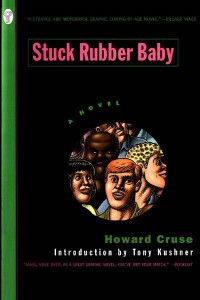
Regular CBLDF readers are probably already aware that comics and graphic novels are frequently challenged or banned for content that would pass without comment in an all-text novel. Would-be censors, often clinging to the notion that any book with lots of pictures must be for children, tend to flip through graphic novels and pick out the most “shocking” images without considering context or the intended audience. At the same time, some censors seem to have a much lower threshold of tolerance for homosexuality than for heterosexuality. For instance, a single page stating that “Some families have two moms or two dads” was enough to get Todd Parr’s The Family Book removed from schools in Erie, Illinois this year. Unsurprisingly, then, graphic novels with LGBT content are often targeted for removal from library collections by those who are not content to simply refrain from reading them, but want to make sure no one else can either. Consider the cases of Fun Home by Alison Bechdel and Stuck Rubber Baby by Howard Cruse.
Alison Bechdel’s Fun Home: A Family Tragicomic is a graphic novel memoir of the author’s childhood, particularly focused on her relationship with her closeted gay father Bruce. As Alison grows older and realizes that she is a lesbian, she and Bruce are both forced to confront how his repression may have affected her own self-image and the way that she dealt with her sexuality. Loaded with literary references and appropriately gothic-tinged (“fun home” is the Bechdel children’s abbreviation for funeral home), the book was included on numerous “best of the year” lists, including Publishers Weekly, Time, Amazon.com, and The New York Times. It was also a finalist for a National Book Critics Circle Award (memoir/autobiography category) and won an Eisner Award (best reality-based work), the Stonewall Book Award (non-fiction), the GLAAD Media Award (outstanding comic book), and the Lambda Literary Award (lesbian memoir and biography).
As with many critically-acclaimed books — particularly graphic novels — Fun Home soon drew the attention of would-be censors. In 2006, Louise Mills of Marshall, Missouri, requested that the book (and another graphic novel, Blankets by Craig Thompson) be removed from the local public library. Mills characterized the books as “pornography” and expressed concern that children might be drawn to them because they looked like comic books. Another citizen who spoke at a library board meeting even contended that the books could result in “seedy people coming into the library and moving into our community.”
At the time of the challenge, the Marshall Public Library did not have an established materials selection policy, which would have laid out guidelines as to what types of items the library should buy. The library board decided to draft such a policy, but also opted to remove the two books from circulation during the development process. After several months, the board ultimately approved a policy which stated in part that the library would buy materials based on contemporary or social significance, critical acclaim, patron requests or popular demand, and “timeliness and/or significance of subject matter.” Both books clearly met several of these criteria and were restored to circulation immediately when the policy was approved, but the ordeal serves as an object lesson on how important it is for libraries to have a materials selection policy in place before a challenge happens.
 In 2005, Howard Cruse’s groundbreaking graphic novel Stuck Rubber Baby was challenged by a now-defunct group that called itself Library Patrons of Texas. The group demanded the removal of the book from the Montgomery County (Texas) Memorial Library System along with 15 other young adult books with gay-positive themes.
In 2005, Howard Cruse’s groundbreaking graphic novel Stuck Rubber Baby was challenged by a now-defunct group that called itself Library Patrons of Texas. The group demanded the removal of the book from the Montgomery County (Texas) Memorial Library System along with 15 other young adult books with gay-positive themes.
The graphic novel tells the coming-of-age story of a young man who grows up queer in the South during the 1960s. The book explores issues of homophobia, racism, and gay identity in a time period where all of those concerns were undergoing profound and revolutionary changes.
Stuck Rubber Baby was honored with nominations for the American Library Association’s Gay, Lesbian, and Bisexual Book Award (now the Stonewall Book Award) and for the Lambda Literary award. It won Best Graphic Novel at the United Kingdom Comic Art Awards and the 2002 French Prix de la Critique.
The book was ultimately retained in the Montgomery County system, but was reclassified from Young Adult to Adult.
Both of these books are based to some extent on the authors’ own teenage years. Banned and challenged authors frequently state that the books they write are the ones their younger selves always wanted to read, but couldn’t find. Too often, people forget that while a particular book dealing with topics like diverse sexual orientations may not be right for them or their children, it is probably exactly the right book for someone else.
Given their visual nature, graphic novels and comic books are among the most-challenged books in libraries and schools. CBLDF is an official sponsor of Banned Books Week, which takes place September 30 – October 6, 2012. Please help support CBLDF’s defense of your right to read by making a donation or becoming a member of the CBLDF!
Maren Williams is a reference librarian who enjoys free speech and rescue dogs.